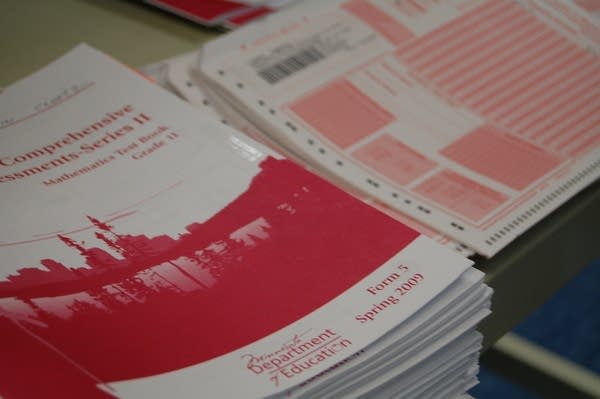Online testing problems worry state education officials
Go Deeper.
Create an account or log in to save stories.
Like this?
Thanks for liking this story! We have added it to a list of your favorite stories.

About a half-dozen Minnesota school districts ran into problems Wednesday when they tried to administer online assessment tests.
Some state education officials some fear the testing delays might hurt student test scores.
Troubles with the Minnesota Comprehensive Assessment tests, or MCAs, have been going on for a week. The problems could result in fines for the company that delivers the test.
Over the last few weeks, thousands of Minnesota students have sat down in front of a computer in to take their MCA tests. Earlier this month, server glitches interrupted online administering of the test.
Turn Up Your Support
MPR News helps you turn down the noise and build shared understanding. Turn up your support for this public resource and keep trusted journalism accessible to all.
The American Institutes for Research, the nonprofit that delivers the MCAs for the state, resolved the problem last week. But this week students in dozens of districts again faced the problem
The test questions have been slow to load, sometimes taking several minutes. Some students have been kicked off the system as they took the test. The cause of this week's problem is yet to be found.
For some -- and no one is quite sure how many -- taking the test has been a frustrating experience.
"High stakes testing produces anxiety in and of itself. And this kind of uncertainty creates understandable consternation among students, among teachers, among families."
Ninety-five percent of the state's students, third through 8th grade, take their math MCAs online. About 30 percent of the students take their reading assessment tests the same way.
The glitches have upset students, teachers and families, said Charlene Briner, chief of staff at the Minnesota Department of Education.
"High stakes testing produces anxiety in and of itself. And this kind of uncertainty creates understandable consternation among students, among teachers, among families," Briner said. "It is not a good situation."
Schools prepare students throughout the entire year for MCA tests, which measure the academic progress of students, ultimately providing the state and federal government data on how well teachers and schools are performing.
Older students need to pass certain MCA tests to get their diplomas.
Educators worry that complications encountered during testing will rattle students and they won't perform as well, especially if they already suffer from test anxiety.
Kevin Ward teaches and is the testing coordinator at Avalon School, a small 7th through 12th grade charter school in St. Paul with fewer than 200 students.
Last week, online testing was delayed for dozens of Avalon students. They had to quit and retest the next day.
Ward crosses his fingers that Thursday's testing goes off without a hitch.
"If the students don't do as well as I think they'll do, that'll be the first thing I'll think: testing was screwed up. That's why it happened," Ward said.
The state has a three-year, $61 million contract with American Institutes for Research to deliver the tests. That contract is set to run out in 2014.
The nonprofit could face fines because of the delays. The state contract outlines financial sanctions of $5,000 per incident if there are hardware, software or other problems.
No one from the company was available to comment for this story.
Briner says the state is working with the company to clear up the problems. Minnesota schools have until May 10 to complete the tests.
But in the end, she says the testing problems may affect how useful this year's test scores are for measuring student progress.
"At a certain point, there are reasonable questions about whether the results of these tests are valid or not," Briner said.
The testing problems come as Minnesota considers changes to how students are assessed. State education officials want to put more assessment tests online, but are now discussing how best to offer high-stakes testing. State lawmakers are considering dropping the tests students take to get a diploma while better aligning other assessment tests with college and career readiness.



